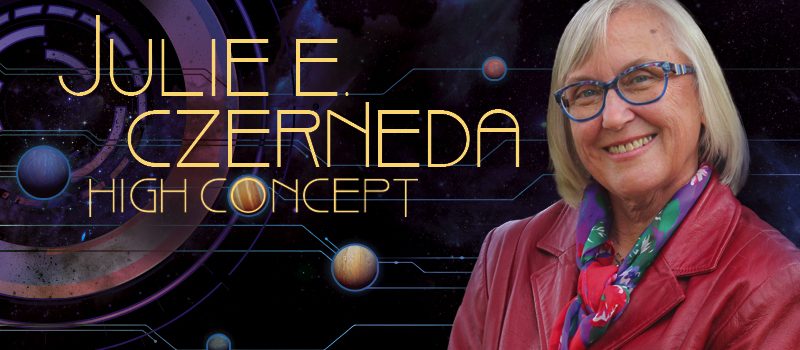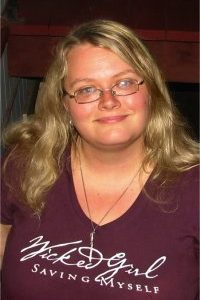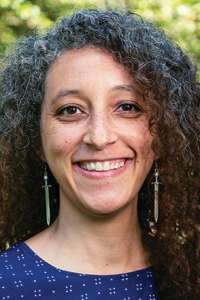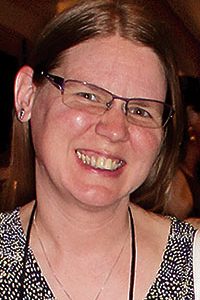Julie E. Czerneda: High Concept
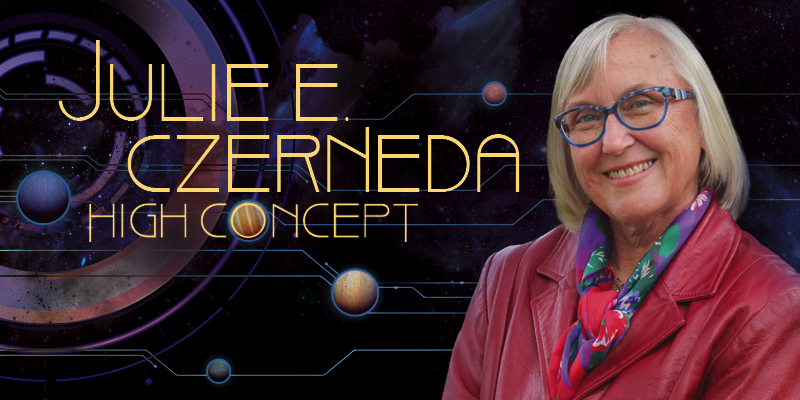
JULIE ELIZABETH STARINK was born April 11, 1955 in Exeter, Ontario, and lived with her family on the air force base in Centralia. She attended the University of Waterloo, where she studied biology and met future husband Roger Czerneda, married in 1976. She did her graduate studies at the University of Saskatchewan, researching fish and the evolution of reproductive communication systems, and also attended Queen’s University. After that, she worked at the University of Waterloo for a time. While she did some fiction writing in university, she began working more seriously on her fiction while working from home as a textbook writer and editor.
Czerneda began publishing genre work with “First Contact, Inc.” (1997), and her story “Left Foot on a Blind Man” (2001) won an Aurora Award. Debut collection Imaginings appeared in 2022.
Her first novel launched her long-running Clan Chronicles universe, which includes three subseries. The Trade Pact books are her debut A Thousand Words for Stranger (1997), Ties of Power (1999), and To Trade the Stars (2002). The Stratification series consists of Reap the Wild Wind (2007), Riders of the Storm (2008), and Rift in the Sky (2007). The Reunification series has This Gulf of Time and Stars (2015), The Gate to Futures Past (2016), and To Guard Against the Dark (2017). She also edited anthology The Clan Chronicles: Tales from Plexis (2018).
She has produced numerous SF series work. The Web Shifters sequence is Beholder’s Eye (1998), Changing Vision (2000), and Hidden in Sight (2003), while Web Shifter’s Library includes Search Image (1998), Mirage (2020), and Spectrum (2021). The Species Imperative series consists of Survival (2004), Migration (2005), and Regeneration (2006). The Night’s Edge fantasy series includes Aurora Award winners A Turn of Light (2013) and A Play of Shadow (2014), with A Change of Place forthcoming in 2024. Her standalone books are Philip K. Dick Award finalist and Aurora Award winner In the Company of Others (2001) and Aurora Award winner The Gossamer Mage (2019). To Each This World is forthcoming.
Czerneda is an accomplished anthology editor. Her books include Packing Fraction and Other Tales of Science and Imagination (1999) and its non-fiction companion No Limits: Developing Scientific Literacy Using Science Fiction (1999);
Stardust (2001); Explorer (2002); Aurora Award winner Space Inc (2003); Orbiter (2003); Odyssey (2004); ReVisions (2004, with Isaac Szpindel); Summoned to Destiny (2004); Fantastic Companions (2005); Mythspring (2006, with Genevieve Kierans); Aurora Award winner Under Covers of Darkness (2007, with Jana Paniccia); Polaris: A Celebration of Polar Science (2007); Misspelled (2008); Ages of Wonder (2009, with Rob St. Martin); Tesseracts Fifteen: A Case of Quite Curious Tales (2011, with Susan MacGregor); and Nebula Awards Showcase 2017 (2017).
She was a finalist for the Campbell Award for Best New Writer (now the Astounding Award) in 1999, and received the Canadian SF and Fantasy Association Hall of Fame Trophy in 2022. She lives in a small town near Ottawa with her partner.
Excerpt from the interview:
“It’s been a long stretch – 25 years. A lot of words. Part of what I’ve learned is to trust myself. Every time Sheila would come back saying, ‘You didn’t do this,’ it was because I didn’t dare to do it, or I felt it was too passionate, or I felt it was too revealing or too silly. And every time she called me on something, I took that as a message to be braver, and to show more, and to put more of myself in the writing. That made my work better, and I began to have more trust in myself and what I was doing and how I did things. It doesn’t mean I don’t still kind of go ‘Whomp!’ every once in a while and say, ‘How is this ever going to happen? How is this going to work?’ But writing is still fun, and I’ve got to the point now where I know it’s going to be a bit of a grind in the first third. You learn that pretty early, and then you know it’s going to feel a little bit floppy in the middle third, and then the last third is going to be the best stuff ever, and after that you have to make everything else fit. That’s how I write. I just muddle through, and suddenly hit that steamroller, and that’s the gratification. I love revising anyway, so I don’t care – I like to fix things, after all. I’ve got confidence now that I can do it.
“I didn’t start that way. I had no idea that anyone else read what I read or liked what I liked. I was suddenly putting words in other people’s heads, and didn’t know if it would work. When Sheila bought A Thousand Words for Stranger, the changes were very minimal, the editor was really happy. I hadn’t pronounced any of my names out loud, and Sheila laughed hilariously when she tried to do it herself and said, ‘You’ve got to change all of these names.’ She was absolutely right. By the second book, I thought, ‘Well, my wonderful shape-shifting blue blob is funny.’ I wanted that humor in there, but I hadn’t read much humor in science fiction. A lot of what I write is because I haven’t read it, and I thought, ‘Oh, I’m going to put this in, I’m going to have her drop down the chimney, hit a fan, and go bleep!’ I thought, ‘Can I get away with that?’ So, I wrote it, and I just waited. Sheila didn’t say a word about that, so in the next book, of course, I did even more humor. Some of it I learn by what she lets me do. But then, she caught me in In the Company of Others, because I did that thing where you go, ‘Six days later,’ and Sheila said, ‘What happened in the six days?’ I said, ‘It’s a long book,’ and she said, ‘Give me what’s happening in those six days.’ I said, ‘Oh, fine.’ We have great conversations. I said, ‘Oh, I can’t imagine that time was interesting,’ but then I thought, ‘No, actually, so much would happen – they’re on this very cool research ship that’s got these little bubbles and things happening, and there’s a really big situation brewing and people will actually talk to each other…. Okay, fine, they can talk to each other.’ It actually worked out very well. Now I have a little note to myself: ‘Is this a six days later moment? Are you doing that again? Sheila will catch you.’ I haven’t done it again.
“One of my favorite exchanges with Sheila was another for In the Company of Others. Sheila started reading it and she said, ‘It’s a space station, people have been trapped there – where is the military, where are the weapons?’ I said, ‘It’s a bus station, basically; people are just stuck.’ Then I thought, ‘She’s right, though, because there will be readers who ask the same question.’ So I basically said that there was a list of rules passed around, and everyone saw them, and they said you’re not allowed to bring this or that on the station. I managed to work my way around it and have it make sense, but only after she caught that. She’s always done that for me – she’s always caught those blind spots, which is what you need in an editor. You need somebody who sees what you don’t see – the things you know perfectly well in your mind, but have never written on the page.
“For me, and to me, science fiction and fantasy are very distinct, because I approach science fiction very much in the sense of, ‘I have a question about the real world, how things work, how things might change, and I want to experiment with that.’ Even if my characters are starship captains or blue blobs or whatever, underneath it all is a question I’m asking about now. I proceed forward trying to keep everything as credible as I can, and I’m comfortable with that – I don’t even have to think about doing it, because that’s my mindset. I love to read fantasy because it takes me somewhere else and it makes my heart pound. I thought for the longest time that I could never actually write the kind of fantasy I like to read – I didn’t even try. There was a point, I think in 2012, when I wrote a paragraph and I thought, ‘I like this.’ Partly I wrote it because I wasn’t enjoying the fantasy I was reading. I was trying new authors, but I don’t like them dark – I like whimsy, the Charles de Lint kind of thing. I like the unexpected, and to feel like you could turn your head and catch a glimpse of something that’s not scary – it’s fantastic! As opposed to horror, which I don’t really care for. I thought, ‘Maybe I’ll write a little something – Ooh, I like that!’, and I put it away. Then I wrote a couple of short stories and I thought, ‘Okay, okay, I can do this a little bit. But novels? Can I do a novel?’
Cover and interview art and design by Francesca Myman
This report and more like it in the November 2022 issue of Locus.
 While you are here, please take a moment to support Locus with a one-time or recurring donation. We rely on reader donations to keep the magazine and site going, and would like to keep the site paywall free, but WE NEED YOUR FINANCIAL SUPPORT to continue quality coverage of the science fiction and fantasy field.
While you are here, please take a moment to support Locus with a one-time or recurring donation. We rely on reader donations to keep the magazine and site going, and would like to keep the site paywall free, but WE NEED YOUR FINANCIAL SUPPORT to continue quality coverage of the science fiction and fantasy field.
©Locus Magazine. Copyrighted material may not be republished without permission of LSFF.


